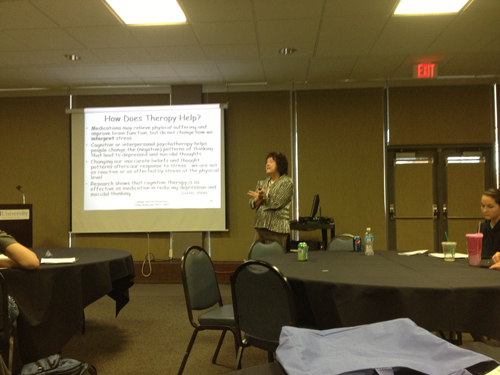The Center for Health and Wellness held a training seminar on suicide prevention for students and faculty Wednesday Oct. 24.
The seminar was sponsored by Adam Board and the Substance Abuse and Mental Health Service Association (SAMHSA), in the hopes of better educating Capital on the dangers that can come from mental illness and depression.
“This is one of a series of trainings that we are having on this subjects,” Cathy McDaniels Wilson, the director of university counseling and health wellness, said.
McDaniels introduced the first session titled: Suicide Gatekeeper Training. This training included educating students on the importance of being aware of the dangers of mental illness and how it may lead to suicide.
Three more discussions are planned for the future, including training for non-practitioners in dealing with mental health and suicide, as well as dealing with depression among the LGBT community and veterans suffering from PTSD.
The seminar was led by Dr. Ellen Anderson, an experienced psychologist who specializes in suicide prevention. Anderson stressed the large problem that mental illness is stigmatized within western culture.
“We don’t really talk about it,” Anderson said. “We don’t really see it, we don’t really want to see it, and that is the definition of a taboo topic.”
As with any problem, lack of recognition in the social consciousness of Americans leads to a misunderstanding of the problem.
But just because nobody talks about it, doesn’t mean that it is not prevalent among friends and colleagues.
“About half the people you see are thinking about suicide,” Anderson said. She stressed that almost everyone has been affected by depression or suicide in one way or another.
Magen Goldstone, a junior who attended the training session agreed that the biggest problem is awareness.
“I feel like everyone knows what suicide is about, but nobody talks about it,” Goldstone said.
Sophomore Shannon Ball agreed.
“I feel like it’s important to have the knowledge to recognize if someone has depression or suicidal thoughts, so that we can help them get the help they need,” Ball said.
“I have learned the signs and symptoms of depression, as well as background information on depression which may help anyone who is suffering from depression.”
This series is targeting handling depression and suicide among students because it applies more to young adults than to any other age groups.
In Anderson’s presentation she cited a quote from the National Institute of Mental Health: “Unlike most disabling physical diseases, mental illness begins very early in life. Half of all lifetime cases begin by age 14; three quarters have begun by age 24. Thus mental disorders are really the chronic diseases of the young.”
“Suicide is the second leading cause of death for college students,” Anderson said.
“The number one cause of suicide for college student suicides (and all suicides) is untreated depression.”
The focus of the Gatekeeper Training is to raise awareness among peers to be able to identify problems that may arise in the mental health of friends, family, or even in themselves. But to combat suicide, it is first important to identify the signs of depression in a student.
There are also ways of combatting depressions and suicidal thoughts.
“You have to learn how to manage your illness,” Anderson said. The best way to do this is to get involved on Campus. Loneliness is a major factor that contributes to depression and so to separate oneself from other people only worsens the problem.
Another problem that contributes to suicide and depression is alcohol abuse. According to Anderson, alcohol has been used as a substitute for counseling or medication for centuries, due in large part to the stigma that exists in being labeled as “mentally ill” or “depressed.”
“This is a ‘better a six-pack than a Prozac’ nation,” Anderson said. This is a huge problem because alcohol is a depressant and only leads to furthering one’s own depression, and also promotes alcoholism.
With this first session being on suicide prevention and depression identification, the next session will be Nov. 15 and 16, and will focus on mental illness. Upcoming events are made to explore more issues that revolve around mental illness.
Students can register for the upcoming sessions at the Health and Wellness website.
To find out more about suicide prevention, call National Suicide prevention Lifeline 1-800-273-8255 or also visit the Suicide Prevention Resource Center at www.sprc.org.
For those that believe they are suffering from depression or are contemplating suicide they should contact the Center for Health and Wellness, whose information can be found at www.capital.edu/health/.
They offer constant support for any issues that students may be having. If a student is having troubles after hours they are encouraged to talk to their RAs, or if a student is in immediate danger, they or someone aware of the problem should contact the proper authorities immediately.
abutts@capital.edu

